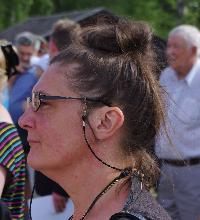
Our Community
Get to know our community
Join Translation Journal
Click on the Subscribe button below to receive regular updates.
Helen Scholdstrom

Question and Answer
- What is your name?
- Helen Scholdstrom
- Where do you live?
- Sweden
- What made you decide to become a translator or interpreter?
- I have always liked languages
- List one strength that you think sets you apart from your colleagues.
- In the old days (the early nineties in my case), I was very much into computers
- Name the one thing that you most enjoy in your translating or interpreting career.
- Independence
- We all have worked on those not-so-perfect assignments. Write about one such assignment that was not ideal and what you learned from it.
- It used to be difficult to get answers to queries, I remember one job about a canning machine and in Swedish it makes a difference what sort of can it is (drinks can, can of food etc) and the agency would not/could not give me an answer. What I learnt from it? Trying to find my own answers, which is a lot easier these days with the Internet. Back then you were pretty stuck...
- If you could go back in time to when you were just starting out as a translator or interpreter, what advice would you give to your younger self?
- Believe in yourself and your abilities
- Name one resource – such as a phone app, CAT tool, website, and so forth – that you find especially helpful in your translating or interpreting work.
- There are so many CAT tools etc., but the enormous amount of information on the Internet is always useful for checking terms, style etc.
- What's the best book you've read this year?
- After the Ice. A Global Human History 20,000-5000 BC by Steven Mithen
20,000 B.C., the peak of the last ice age--the atmosphere is heavy with dust, deserts, and glaciers span vast regions, and people, if they survive at all, exist in small, mobile groups, facing the threat of extinction.
But these people live on the brink of seismic change--10,000 years of climate shifts culminating in abrupt global warming that will usher in a fundamentally changed human world. After the Ice is the story of this momentous period--one in which a seemingly minor alteration in temperature could presage anything from the spread of lush woodland to the coming of apocalyptic floods--and one in which we find the origins of civilization itself.
Drawing on the latest research in archaeology, human genetics, and environmental science, After the Ice takes the reader on a sweeping tour of 15,000 years of human history. Steven Mithen brings this world to life through the eyes of an imaginary modern traveler--John Lubbock, namesake of the great Victorian polymath and author of Prehistoric Times. With Lubbock, readers visit and observe communities and landscapes, experiencing prehistoric life--from aboriginal hunting parties in Tasmania, to the corralling of wild sheep in the central Sahara, to the efforts of the Guila Naquitz people in Oaxaca to combat drought with agricultural innovations.
Part history, part science, part time travel, After the Ice offers an evocative and uniquely compelling portrayal of diverse cultures, lives, and landscapes that laid the foundations of the modern world.
